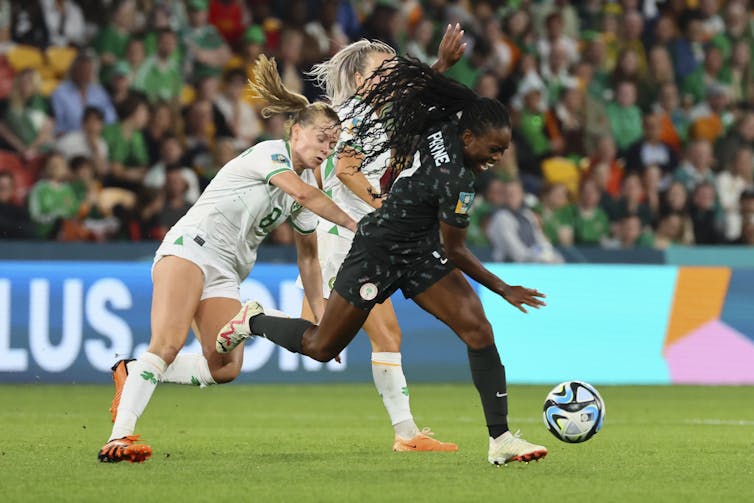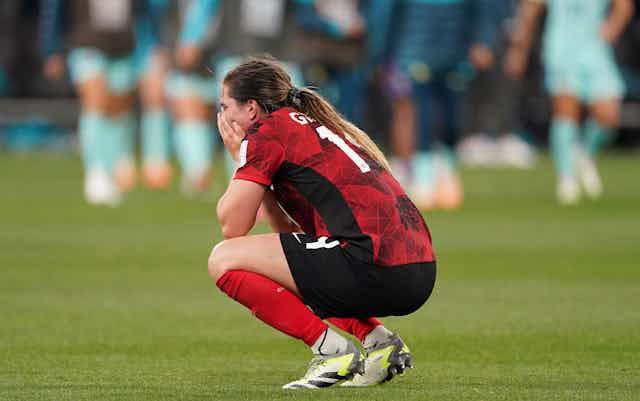Heading into the Canada versus Australia Women’s World Cup match on July 31, I thought about who I should cheer for. As a proud Canadian and supporter of our women’s team, the answer seems obvious.
But as an academic specializing in the intersection of sport, ethics and international affairs and in the process of developing a politics-based web resource for the Women’s World Cup, the answer becomes more complicated.
Canada faced Australia with a chance to advance to the knockout phase at the Women’s World Cup. Ranked seventh in FIFA and the reigning Olympic champions in soccer, the Canadian Women’s National Soccer Team tied Nigeria to open the tournament, before a comeback victory over Ireland put them on top of the Group B table.
But unfortunately, the Canadians lost 4-0 to Australia, leading to their unexpected elimination from the World Cup. Canada’s failure to progress out of the group stage is a disappointment for many.
A 21st century powerhouse
The Canadian women’s soccer team has represented Canada well on and off the pitch. They have been a 21st century powerhouse, winning bronze medals at the 2003 FIFA World Cup, as well as the 2012 and 2016 Olympics in addition to their 2020 gold medal.
Current team members such as Christine Sinclair, Kadeisha Buchanan, Janine Beckie, Ashley Lawrence and Jessie Fleming have become household names as well as stars on the global stage.
Canada also has a relatively well-established women’s game, both in terms of participation and interest in the national team compared to most countries. With the introduction of a professional league slated to kick off in 2025, the future for the women’s game is bright in Canada and the influence of its top players continues to grow.
The national team’s collective success has also drawn significant attention to women’s sport in Canada and transgender rights in sport more broadly.
The team’s efforts to achieve gender equity by challenging Canada Soccer’s lack of support and compensation also has wider implications for Canadian society, and will hopefully lead to an improved soccer system.
But the big picture implications of Canada’s loss go beyond national pride.
Australian women’s soccer
Like Canada, soccer is a popular sport amongst women and girls in Australia. The professionalization of the A-League Women, Australia’s women’s soccer league, provides top players with a path for pursuing professional soccer.
As co-hosts of the first Women’s World Cup in the southern hemisphere, the performances of both Australia and New Zealand could have significant implications for the future of women’s soccer.
If both co-hosts were to be eliminated in the group stage, it would reduce the chance to generate interest in women’s soccer and raise awareness about gender issues in sport worldwide. Considering the significance of the tournament’s location, having at least one home nation progress is important.

With New Zealand failing to move beyond the group stage, the burden of upholding the Women’s World Cup’s legacy now rests on Australia.
One aspect of this responsibility is continuing to promote women’s soccer to a wider audience. FIFA, for example, has gambled on increased viewership across Asia to offset time zone challenges faced by European and North American audiences.
Nigerian women’s soccer
The other team to advance from Group B are the Nigerian Super Falcons, who progressed after a draw with Ireland on July 31. Nigeria’s pre-tournament was plagued by equal rights and equitable pay battles with their national federation.
In fact, Nigerian team members threatened to boycott their opening match against Canada over the dispute.
Nigeria’s battle for equality happens in a country that, according to most measures, ranks near the bottom of World Cup nations (and globally) for women’s rights, opportunities, health and economic security.

For example, Nigeria is ranked 168th in the world on the UN’s Gender Inequality Index. They are tied for last with Haiti for the lowest index score amongst World Cup participants.
So, while the Canadian women’s fight for equality has more national implications, Nigeria’s women’s soccer team’s gender battles may have broader implications that reach farther beyond sport.
Upsides and downsides
Despite the big picture, long-term implications for Australia and Nigeria progressing in the tournament, my interest on July 31 remained on a Canadian victory. As the Australians dominated the game, I simply felt disappointment.
This is the most fascinating thing about sport — its layers. People watched the game from a variety of perspectives: I watched through a pro-Canadian sport fan lens; neutrals may have watched for the athletic spectacle; commercial partners hoped for favourable returns on their investments; social activists might have hoped for Nigeria to progress to change attitudes about women at home; English supporters would want the easiest knockout phase opponent to play next; and FIFA likely crossed their fingers for the co-host to win.
Sport can be an escape and an ideological battleground, an arena that both brings us together and creates enemies. It can be a form of play and a political tool. And with the growth of women’s soccer, the non-sport aspects of its major events will only expand — for better and worse.
So while the FIFA Women’s World Cup is an opportunity to “unite the world” and to “unite for gender equality” through soccer, it is also a tool for political soft power, commercial investment and nationalistic fervour.
The upside of the World Cup is also its downside — it’s complex, tension-riddled and layered. In the end, Australia and Nigeria have advanced and Canada will contemplate a future after Sinclair. But there’s still good reasons — maybe even better reasons depending on your vantage point — for Canadians to keep paying attention.

